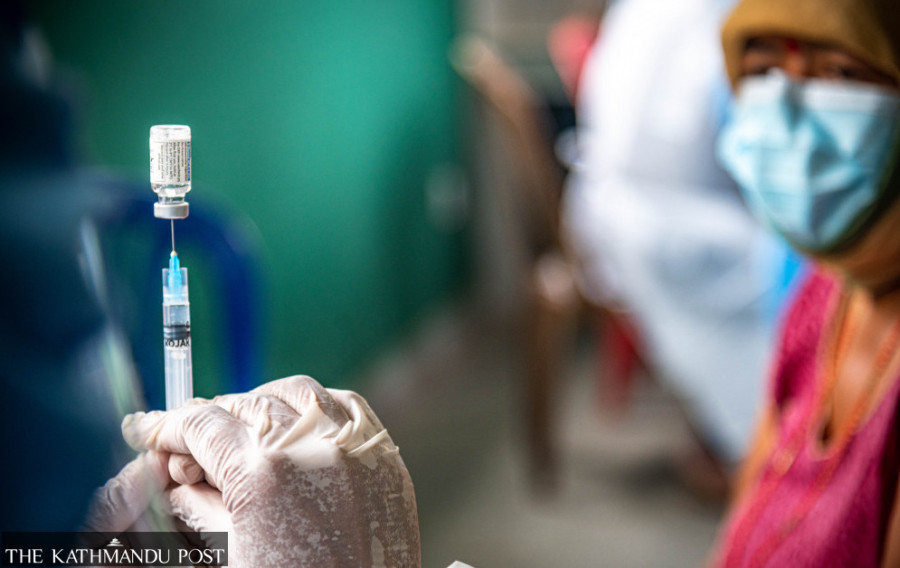Health
Children are going to schools, so why not vaccinate parents, doctors ask
Covid-19 has infected 62,979 children under 18 and killed 86 since the start of the pandemic. Experts say inoculating the parents is the best way to stop infections in communities.
Arjun Poudel
The Health Office, Khotang, previously known as the district public health office, has started vaccinating all students above 18 years old for Covid-19.
Officials said they have started immunising the students, as many people in the priority age group did not seek immunisation.
“Instead of letting the vaccine expire and discarding them, we have started vaccinating the students,” Punya Prasad Sigdel, the chief of the Health Office told the Post over the phone. “We decided to vaccinate students because they are also among the groups highly vulnerable to Covid-19.”
Public health experts say vaccinating students is a good decision, as they are vulnerable to infection and can pass the contagion to other family and community members.
Although students are highly vulnerable to Covid-19, especially after reopening of schools amid the pandemic, vaccines are not available to all students.
As authorities in most of the districts have already resumed in-person classes, chances of children getting infected have increased. Doctors say infected children could not only pass the infection to their classmates and teachers but also to their parents and elderly family members.
“Most teachers have already been vaccinated and we do not have a vaccine to administer to the children, so why not vaccinate all the parents,” Dr Biraj Karmacharya, an epidemiologist, told the Post. “Children either bring the infection from home or from schools, so if we vaccinate the parents, the chances of children getting infected lessen.”
So far, 62,979 children under 18 years old have been infected with Covid-19 and 86 died of the disease since the start of the pandemic last year.
During the first wave of the pandemic, 21,523 children were infected and 38 died whereas 41,456 children were infected and 48 died during the second wave.
Doctors say although the severity rate and deaths in children are very low, children could easily play the role of the virus carriers.
“If we can check the infection at home, chances of spreading the disease by children lessens,” added Karmacharya, who is also the head of the Department of Community Programmes at the Kathmandu University’s Dhulikhel Hospital. “Vaccinating the parents of school children protects children from getting infected and parents from getting the virus from their school-going children.”
Studies show vaccines help prevent the spread of Covid-19. Like adults, children can transmit the coronavirus to others if they are infected, even when they have no symptoms.
Authorities concerned have already vaccinated the teachers serving in both government as well as private schools.
The Ministry of Health and Population has been launching the immunisation campaign in phases targeting the most vulnerable groups. In the first phase, the vaccine was given to frontline workers, including health workers, administrative staff serving in health facilities, sanitation workers, security personnel, elderly people taking refuge at old-age homes, journalists, diplomatic workers, bureaucrats, and lawmakers. Elderly people over 65 years were immunised in the second phase of the campaign. Later, teachers and essential workers were immunised.
Some local units have been providing the jabs to all people above 18 years old and the government has been also providing the vaccine to the migrant workers and those going abroad.
“Prioritising the parents of young children will be scientific and will also address the problems of selecting the target group,” Dr Keshab Deuba, a public health epidemiologist, told the Post. “It is an easy way to increase the immunisation coverage by making it mandatory for the parents of school going children to get vaccinated.”
Authorities can also administer the vaccine at the respective schools by inviting the parents to reduce crowds at vaccination centers.
“There is no vaccine hesitancy as of now in our country, but the interest in vaccination could decline once the vaccination coverage grows,” added Deuba.
Some local units including those in the Kathmandu Valley have reported that all people who took the first dose of the Covishield vaccine between March 7 and 15 did not seek the second dose.
The Health Office, Kathmandu said that around 40 percent of the people above 65, who had taken the first dose of Covishield, did not seek the second dose.
Local health authorities provided the vaccine to other age groups, including the students who were due to sit for exams, after the elderly people did not seek the jabs.
“As we don’t have sufficient doses and cannot secure them at once, we cannot take the decision to vaccinate all the parents of school-going children,” Dr Jhalak Sharma, former chief of the National immunisation Programme, told the Post. “We have to administer the shots as per the age groups.”
Health Ministry officials said that the ongoing vaccination programme will cover the parents of most children.
“With more vaccines coming, we will lower the age group for vaccination, which will cover the parents of most children,” Dr Samir Kumar Adhikari, joint spokesperson for the Health Ministry, told the Post. “If we can administer the vaccine to people above 25, most of the parents will be covered.’’
However, even if authorities have lowered the age group for the vaccines, all people in the priority groups have not been taking the jabs. Doctors say the virus will keep circulating until everyone is vaccinated.
So far, 6,004,019 people (over 20 percent have taken the first dose and 5,415,427 people (over 18 percent) have been fully vaccinated. The Health Ministry aims to inoculate 33 percent of the population before Dashain.




 11.84°C Kathmandu
11.84°C Kathmandu















